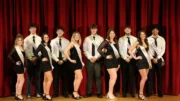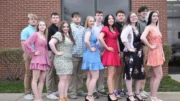For much of its titanic length, “The Haunting of Hill House,” which premiered Friday on Netflix, does interesting things with character and atmosphere and maintains an air of melancholic suspense. But 10 hours is a long time to tell a ghost story, which might easily be delivered in the space of a feature film, short story, folk ballad or slumber party before Mom yells to put away the flashlight and go to sleep.
The series is “based on” Shirley Jackson’s 1959 novel of the same name, which is to say, it lifts a setting, a couple of characters, several names, selected incidents, odd details and occasional passages of prose from the book and makes something almost entirely different out of them. It also departs from the novel’s two film adaptations, both titled “The Haunting.” But it would have to, just as a 10-hour “Hamlet” would need to introduce, say, a trip to the fair, some dance numbers, a subplot for Fortinbras and a chase scene.
Meet the Crains, late 20th century edition. Mom Olivia (Carla Gugino) and dad Hugh (Henry Thomas) have taken temporary possession of an imposing old Massachusetts mansion they intend to restore and flip to become rich. (That this is a ghost story, and a less ambiguous one than Jackson’s, means that just who is in possession of what, or what of whom, will be in question.)
They live there while the work goes on, along with their children, Steven (Paxton Singleton), Shirley (Lulu Wilson), Theo (Mckenna Grace), whom we first glimpse reading Jackson’s “The Lottery”), and Nell (Violet McGraw) and Luke (Julian Hilliard), who have a “twin thing.”
Also around are the caretakers, Mrs. and Mr. Dudley (Annabeth Gish and Robert Longstreet), who have religion, as is customary. And various spooks, not seen by everyone, and only glimpsed rarely by those who do. Without saying anything you wouldn’t expect, it does not end well. And that is only the beginning.
Meet the Crains of today. A quarter-century has passed. (The series hops back and forth in time.) Mom is no longer in the picture; dad (Timothy Hutton) isn’t around much. Steven (Michiel Huisman) has gotten rich writing books about ghostly phenomena, beginning with one about the summer his family spent in what came to be known as “America’s most famous haunted house,” though he has never seen a ghost himself. Shirley (Elizabeth Reaser), having discovered her calling young, is a mortician who has no time for phantoms. She is not happy about Steven’s book.
More in tune with the uncanny are Theo (Kate Siegel), a psychiatrist working with traumatized kids, Luke (Oliver Jackson-Cohen), a junkie in shaky recovery; and Nell (Victoria Pedretti), a troubled soul off her medication and being visited by old unfriendly apparitions. (That’s Russ Tamblyn, a star of the book’s first film adaptation, as her therapist.) As a family, you could call them broken.
I was on board through much of it. It’s fine for a story to take it slow, and to build out characters in ways a movie doesn’t have the time to do. (Each of the many Crains is the focus of an episode, with episodes left over!) One thinks from time to time of “Stranger Things,” largely because of its excellent younger cast, who are mostly well-written for, and stay believable even when they are called upon to be cute. Early on, creator-director Mike Flanagan creates a good deal of tension without resorting to the usual cinematic tools of suspense — creepy music, shock cuts, crazy camerawork. Later on, he resorts a bit.
And there is lot of “later on.” The nonlinear, 4D-puzzle structure of the storytelling means that we already know much about what will happen to the characters, making the series into something of a waiting room. Conversations run in circles; points are made and then made again and once more for good measure. Would you like Hugh Crain to say “I can fix this” one more time? He probably will. With so many hours to fill, things get nuttier, and not necessarily in a good way.
Halfway through, at Episode 6, which gathers all the family together, the series takes a strange formal detour — the first 23 minutes constitute a single tracking shot, followed by another take of nearly equal length, before returning to conventional cinematic cutting in the last several minutes. The effect is talky and theatrical, with more than a few characters delivering substantial, revelatory monologues of the sort that introduce a critical turn in the last act. The formal trick is not repeated, but we will get more speeches going forward; even Mr. Dudley gets a five-and-a-half-minute closeup in which to tell a tale.
And so, at a moment where a horror movie would typically have 20 minutes to go, “Hill House” still has two hours left, which means more detours, more long speeches. Steve says near the beginning of the series that one thing he never found for what supposedly happened at the house was “a reason,” and you don’t exactly get one here, but you will not lack for explanations, or aphorisms, as you make your way to an ending that is not Shirley Jackson’s.
One senses that creator Flanagan felt this material keenly, and that he had some things of his own about parents and children and brothers and sisters and life and death he really needed to say, and said them all, literally to the last word.








































